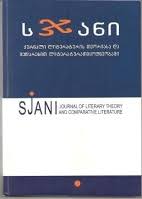მითისქმნადობის სპეციფიკა ვაჟა-ფშაველას პოემებში
Specifics of Creation of Myth in Vazha Pshavela’s Poems
Author(s): Manana KvachantiradzeSubject(s): Comparative Study of Literature, Other Language Literature, Theory of Literature
Published by: ლიტერატურის ინსტიტუტის გამომცემლობა
Keywords: Meeting; collective memory; generate;
Summary/Abstract: Myth represents artistic and poetic origin of Vazha Pshavela’s epic poems – its preform, its main structural and perceptional principle. The object of our article is not an analysis of mythological forms in Vazha Pshavelas’s literature that are older than literature itself, but on the contrary – we are observing literature motifs, fabula or action that construct foundation of myth, that define, introduce and strengthens mythic structure. The correlation between mythic and poetic origins is evident in Vazha Pshavela’s literature. What are poetic devices used by author for attributing mythic features to his message, what is the content of these messages that are disclosed in “Aluda Qetelauri” and ,,Host and Guest”. In “Aluda Qetelauri” as well as in “Host and Guest” the message function is attributed to the meeting as to exeptional occurrence. In “Host and Geuest” this iterational (repetitive) sign is represented as a realized micromodel (the rite of meeting of the three) in the final scene of the poem. Meeting is nothing else then a cronotopos of “intrusion” of metaphysical into the real world. The morphology of mankind existence is defined by meeting of dissimilar as well as by transformation dynamics caused by these meetings. It’s exactly the topos of meeting that gives birth to constant intention of human soul– free will against the established social norms also visible in Aluda’s character. As an additional structure for myth creation Vazha Pshavela uses picture of nature e.g. in the final of “Host and Guest” we can see unexpectedly appeared invincible darkness. Snow and snowstorm, valance and ice that block Aludas’s road are not only the stylistic tools representing internal picture of protagonist, but also mental structure that strengthens mythic element in the poem. Vazha Pshavela’s stylistic tool of converting literature story into popular story could be considered as a product of mythic imagination. Author takes his ,,story’’ from individual consciousness and places it in the space of collective consciousness. The comment to final scene in “Host and Guest” “They tell about heroes…” is the reference to mythic words. It is the myth derived from collective memory reminded by literature and once again involved in eternal cycle where mythic and poetic are still represented as undivided creative origin. It is directly related not only to the story told in the poem but to all the stories that had ever taken place and will happen in future in order to defend personal free will in the name of courage and relenting.
Journal: სჯანი
- Issue Year: 2019
- Issue No: 20/2
- Page Range: 20-34
- Page Count: 15
- Language: Georgian

